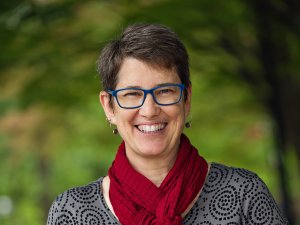Presented By: Eisenberg Institute for Historical Studies
EIHS Lecture: Medieval Chests as Ideological Objects
Katherine French, University of Michigan

Abstract: Chests were the most common piece of medieval furniture. As aristocratic households moved from castle to castle, chests transported the valuables that accompanied them. After the Black Death, they were instrumental in helping Londoners cope with the consequences of the so-called consumer revolution: what to do with the profusion of dishware, clothing, and knick-knacks when they were not in use, and how to retrieve them when needed. Embedded in the routines of storage were larger ideological concerns of order, gender, and behavior; highly contested issues in the post-plague world. The chest helps us understand how domestic dynamics changed in the two-centuries following the plague.
Katherine French received her PhD in 1993 from the University of Minnesota, where she worked with Barbara Hanawalt. She taught at SUNY New Paltz, one of the regional universities in the SUNY system, for eighteen years before being appointed the J. Frederick Hoffman Professor of medieval English history at the University of Michigan in 2011. She has held fellowships at the Harvard Divinity School, the National Endowment for the Humanities, the Institute for the Humanities at Princeton, and U-M's Institute for the Humanities. Her scholarship focuses on women, religion, and material culture in late medieval England. Her first two monographs, The People of the Parish: Community Life in a Late Medieval English Diocese (Philadelphia, 2001) and The Good Women of the Parish: Religion and Gender after the Black Death (Pennsylvania, 2008), analyzed the religious practices of English peasants and townspeople in the two hundred years between the Black Death (1348) and the Reformation. Most Reformation scholarship argued that local life was disintegrating. She was interested in the ways in which community identity and gender shape religious practice. She has also co-authored a text book Women and Gender in the Western Past (Houghton Mifflin, 2001) and is the author of more than twenty articles and book chapters. Her current book project “Household Goods and Good Households in Late Medieval London” continues to try to understand the consequences of losing between a third to a half of the population to the Black Death. It asks how did increasing consumption after the Black Death by London’s merchants and artisans shaped their household dynamics.
Free and open to the public.
This event is part of the Thursday Series of the Eisenberg Institute for Historical Studies. It is made possible by a generous contribution from Kenneth and Frances Aftel Eisenberg.
Katherine French received her PhD in 1993 from the University of Minnesota, where she worked with Barbara Hanawalt. She taught at SUNY New Paltz, one of the regional universities in the SUNY system, for eighteen years before being appointed the J. Frederick Hoffman Professor of medieval English history at the University of Michigan in 2011. She has held fellowships at the Harvard Divinity School, the National Endowment for the Humanities, the Institute for the Humanities at Princeton, and U-M's Institute for the Humanities. Her scholarship focuses on women, religion, and material culture in late medieval England. Her first two monographs, The People of the Parish: Community Life in a Late Medieval English Diocese (Philadelphia, 2001) and The Good Women of the Parish: Religion and Gender after the Black Death (Pennsylvania, 2008), analyzed the religious practices of English peasants and townspeople in the two hundred years between the Black Death (1348) and the Reformation. Most Reformation scholarship argued that local life was disintegrating. She was interested in the ways in which community identity and gender shape religious practice. She has also co-authored a text book Women and Gender in the Western Past (Houghton Mifflin, 2001) and is the author of more than twenty articles and book chapters. Her current book project “Household Goods and Good Households in Late Medieval London” continues to try to understand the consequences of losing between a third to a half of the population to the Black Death. It asks how did increasing consumption after the Black Death by London’s merchants and artisans shaped their household dynamics.
Free and open to the public.
This event is part of the Thursday Series of the Eisenberg Institute for Historical Studies. It is made possible by a generous contribution from Kenneth and Frances Aftel Eisenberg.